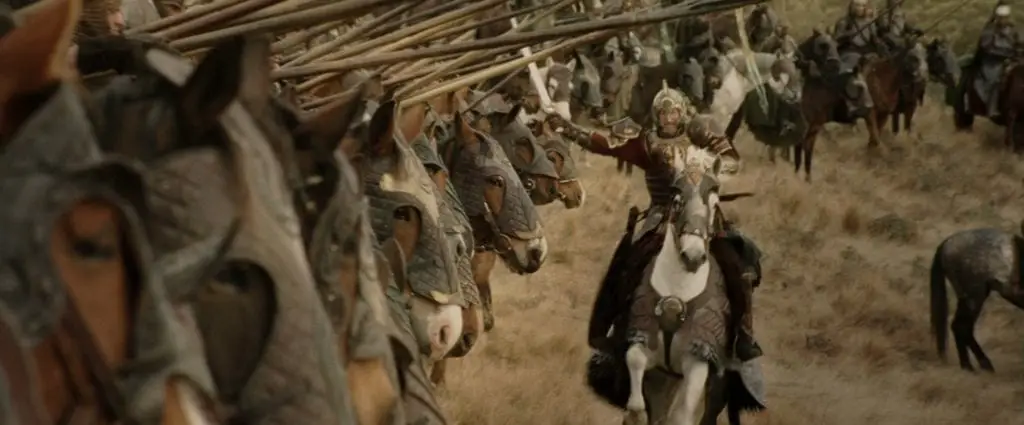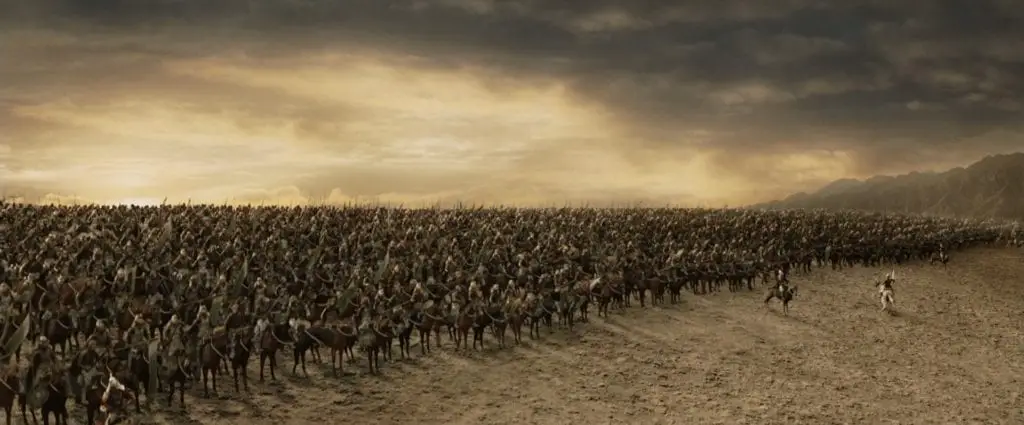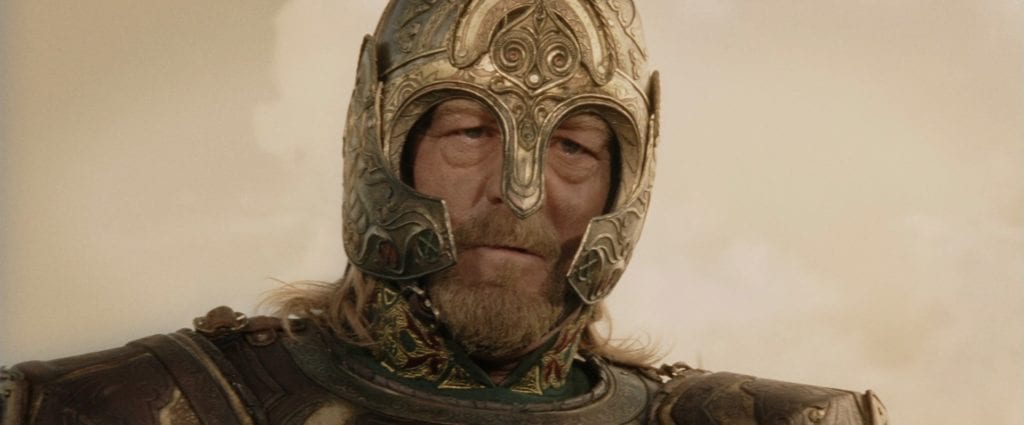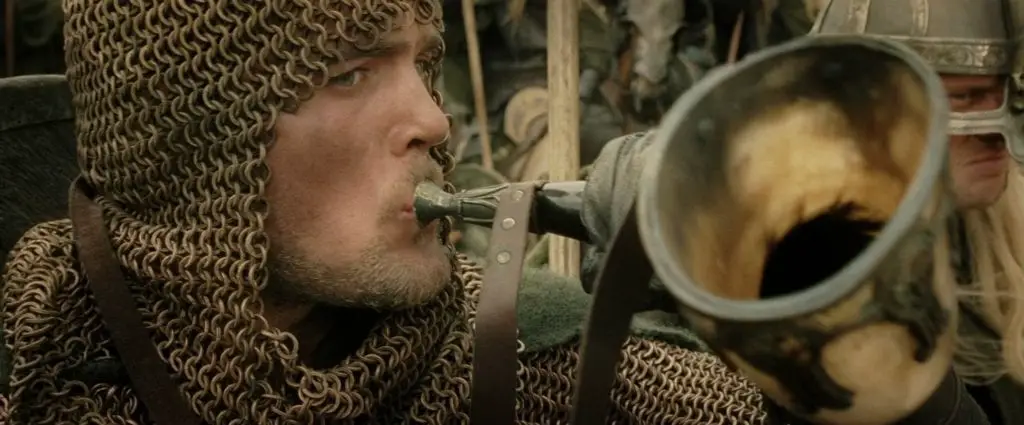So. My guys. Ghân-buri-Ghân. I have been low-key dreading this chapter since the start of our re-read, wondering what useful things I could possibly say about a white British professor in the 1950s indulging in an obvious and unfortunate noble savage trope. I mean, there’s a reason that even Peter Jackson—not exactly a bastion of inclusivity and racial sensitivity in his depictions of Tolkien—decided to just leave this bit out.
I’d love to give you a little turn here and reveal that hey-guys-actually-Ghân-buri-Ghân-isn’t-so-bad. But, well… Ghân-buri-Ghân is not great. He could be worse? But that doesn’t seem to be the most useful measuring stick. So instead, let’s take a look at why Ghân-buri-Ghân is in this story at all. And why he is the one to set the stage for one of the most striking passages in Tolkien, where Théoden arrives at the walls of Minas Tirith at dawn and thunders across the Pelennor that only a chapter ago seemed soaked in despair.

Ghân-buri-Ghân and the Wild Men
Let’s start with the obvious: Ghân-buri-Ghân and the Wild-men are dehumanized and exoticized pretty consistently from the start. Within a page or two of his introduction he is compared to a beast, a rock, and a plant. The Wild-men are “remnants of an older time,” Elfhelm tells Merry. And they are “wild and wary as the beasts.” Ghân-buri-Ghân himself is “gnarled as an old stone” and his beard “straggled on his lumpy chin like dry moss.” Merry has difficulty telling him and the other Wild-men apart from each other. And while the Wild-men are never given any explicitly racial characteristics, they are characterized by habits that would be associated with “exoticism” from a European colonial perspective: grass skirts and communication over distances by drums.
To Tolkien’s credit, he does push back against this idea a little bit, largely through Ghân-buri-Ghân’s repeated refusal to be patronized. He repeatedly calls out Éomer for treating him like a child and for interrupting him. He has his own ideas and agenda that extend beyond helping the nice horse lords who happened to stop by. Though on a side-note—Tolkien also manages to make the Wild-men seem preternaturally chill when he casually reveals that they are helping Théoden and his men despite the fact that the Rohirrim, in the past, apparently hunted the Wild-men for sport. Jesus, Rohan.
So. We have a scenario where Ghân-buri-Ghân is given a solid sense of agency in his appearance but is also loaded up with baggage associated with colonial attitudes towards the “uncivilized” peoples of the world. But none of this really answers the question: why is Ghân-buri-Ghân here? Why is he in the story at all? It’d be easy to have the exact same thing happen, but simply have the knowledge of the hidden path lie with one of the Rohirrim or Théoden himself. It would streamline the story and skip the necessity of a whole different group of characters. You could even as gone so far as to simply start the chapter with Théoden’s arrival on the field, and combine it with the next’ chapter’s battle.

Past and Present in The Return of the King
Of course, that’s not what happens. Instead, our next chapter features the imminent fall of Minas Tirith being averted by two sudden arrivals. Théoden and the Rohirrim appear, shepherded there by the Wild-men. And Aragorn and the Dúnedain arrive, backed by the Dead Men of Dunharrow.
Now, I’m not totally sure what this means. I’m open to ideas, and it’s something that I’ll be continuing to think about (the perils of writing an article the day it’s due, sorry friends). But in any case, it seems intriguing to me that both our kings—Théoden and Aragorn—make their triumphant arrival at Minas Tirith thanks solely to the aid of mysterious and unexpected forces of the past. Aragorn calls up a ghost army. Théoden is guided by a people that—as noted in this great article by Ethan Campbell —are directly tied to wodwos, the wild, forest-men of medieval romances like Gawain and the Green Knight. This commonality is only highlighted by Merry’s observation that the Wild-men reminded him of the Púkel-men that lined the way to the Paths of the Dead at Dunharrow.
Neither case is really attributable to plot dynamics. Both of these things could have happened without the last-minute, unexpected assist. So the fact that they do, and that they happen in such tight thematic parallel, makes me think that there must be something more intentional at play. Though it’s hard without more extended interactions with either group, I think it’s at least possible to make the case that this double assist serves as a nice thematic underpinning of Tolkien’s repeated idea that the past is something to be remembered but not necessarily blinded emulated.
While Aragorn’s past is literally what qualifies him for the throne—and what gets him his ghost army—Théoden’s and Rohan’s interactions with their past are much more ambivalent. It’s obvious to the reader that the Wild-men have been mistreated in the past. The same can be said for the treatment of the Dunlendings in The Two Towers. The fact that Minas Tirith is delivered largely thanks to a ghost army who betrayed their leaders in the past and a small group men who have been betrayed themselves, creates an interesting note of moral and historical complexity in a scene that could otherwise easily be read as a standard clash of good and evil.

The Charge of the Rohirrim
Even without that complexity, though: Théoden’s charge and the arrival of the Rohirrim is such a stirring narrative moment. It would have been so easy for it to be cheesy: Widfara’s sudden claims that “the wind is turning” and the dawn is coming are standard fantasy tropes. But man, the execution of it. This is Tolkien at his best.
The Rohirrim’s easy arrival at the wall and painstakingly slow walk across the outer fields makes it feel as if the Riders are literally entering into the tone of the last chapter. The world is filled with darkness, despair, gloom and fire. Merry is horrified. Théoden seemed “to shrink down, cowed by age.” Effort seems wasted, and there seems no place to go. And then, there’s the turn. It’s good enough that I want to look at the whole thing in full:
Then suddenly, Merry felt it at last, beyond doubt: a change. Wind was in his face! Light was glimmering. Far, far away, in the South the clouds could be dimly seen as remote grey shapes, rolling up, drifting: morning lay beyond them.
But at that same moment there was a flash, as if lightning had sprung from the earth beneath the City. For a searing second it stood dazzling far off in black and white, its topmost tower like a glittering needle; and then as darkness closed again there came rolling over the fields a great boom.
At that sound the bent shape of the king sprung suddenly erect. Tall and proud he seemed again; and rising in his stirrups he cried in a loud voice, more clear than any there had ever heard a mortal man achieve before:
Arise, riders of Théoden!
Fell deeds awake: fire and slaughter!
spear shall be shaken, shield shall be splintered,
a sword day, a red day, ere the sun rises!
Ride now, ride now! Ride to Gondor!
With that he seized a great horn from Guthláf his banner-bearer and blew such a blast upon it that it burst asunder… Suddenly the king cried to Snowmane and he sprang away. Behind him his banner blew in the wind, white horse upon a field of green, but he outpaced it. After him thundered the knights of his house, but he was ever before them. Éomer rode there, the white horsetail on his helm floating in his speed, and the front of the first éored roared like a breaker foaming to shore, but Théoden could not be overtaken. Fey he seemed, or the battle-fury of his fathers ran like new fire through his veins, and he was borne upon Snowmane like a god of old, even as Oromë the Great in the battle of the Valar when the world was young. His golden shield was uncovered, and lo! It shone like an image of the Sun, and the grass flamed into green about the white feet of his steed. For morning came, morning and a wind from the sea; and darkness was removed, and the hosts of Mordor wailed, and terror took them, and they fled, and died, and the hoofs of wrath rode over them.
It’s such a wonderful, visceral passage, filled with alliteration and momentum. All those B’s and F’s! The way Tolkien moves from sentences structured along the lines of A, but B (Behind him his banner blew in the wind, white horse upon a field of green, but he outpaced it. After him thundered the knights of his house, but he was ever before them) to a series of shorter and shorter clauses creates a syntax that seems to accelerate along with the riders themselves. It’s a near-perfect passage, a bright release after chapters of mounting dread.

Final Comments
- I’d love to hear anyone’s thoughts on Ghân-buri-Ghân’s diction and speaking patterns. On one side I could sort of see the argument that he’s simply speaking the way anyone would speak in language they aren’t comfortable speaking. Lots of dropped articles, overly-literal translations. But at the same time it just sounds SO MUCH like a stereotype of “uncivilized” speech, like an American Indian in an old western flick. I want to give Tolkien more credit, as a linguist, than indulging in something like that. But I’m not sure it’s warranted.
- Another chapter-related note from Ethan Campbell’s article: Théoden’s speech to his riders before their charge is heavily influenced by the famous Old English poem about the Battle of Maldon. If you are intrigued, Tolkien wrote a fan fiction sequel and published it in a scholarly journal (which is my new professional goal now, I guess).
- Elfhlem and the rest of the company seem to be find with turning a blind eye to Merry’s presence. I’m assuming that they know that Dernhelm is Éowyn as well? It seems pretty likely to me—they have “an understanding,” as Merry notes. And I like the idea of the Rohirrim deciding to cover for her.
- Tolkien continues to get a kick out of the Enemy ironically undermining their own plans through excessive, thoughtless badness. This time through Éomer: “Our Enemy’s devices oft serve us in his despite. The accursed darkness itself has been a cloak to us. And now, lusting to destroy Gondor and throw it down stone from stone, his orcs have taken away my greatest fear. The out-wall could have been held long against us.”
- Merry wished he was a tall rider like Éomer and could blow a horn or something and go galloping to [Pippin’s] rescue. This is such a charming little sentence that nicely underlines how out of his element Merry is here. He doesn’t even quite know what a tall rider would do to go save some one. Blow a horn? Or something?
- Tolkien taught me this week that “writhe” can be an adjective, as in “writhen mountains.” Into it.
- Prose Prize: … last two paragraphs? Honestly, just go read the last page or two. It’s Tolkien at his best, using his prose to craft a wave of momentum, his tone elevated and archaic but crackling with energy at the same time.
- Contemporary to this Chapter: Faramir is wounded, the Pelennor is overrun, the siege of Gondor continues. Off to the south Aragorn is seizing the fleet at Pelagir. Over to the east Frodo gets himself captured and then freed from Cirith Ungol.
- Next time we finally come to the Battle of Pelennor Fields. Bring your own tissues! I am already sad!

